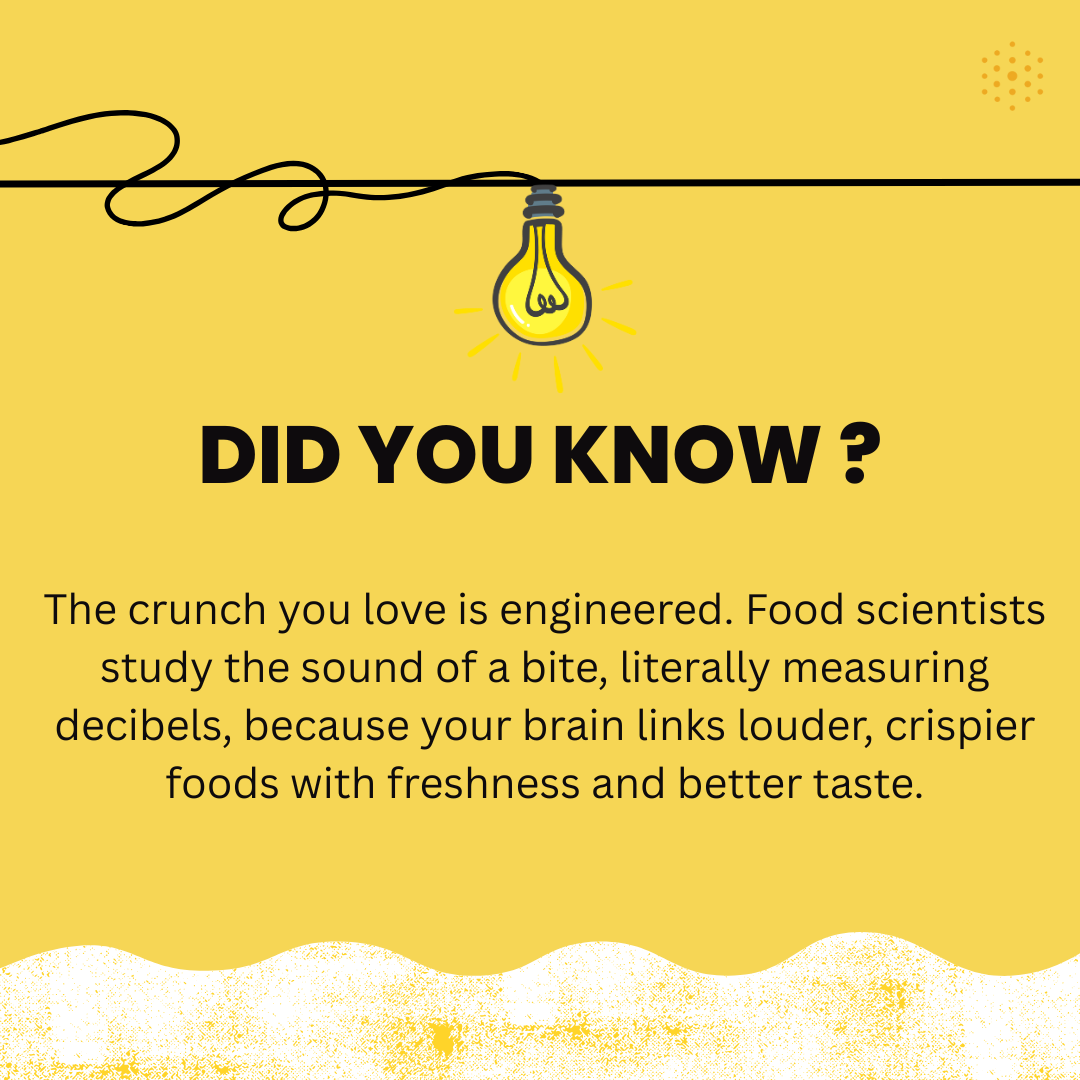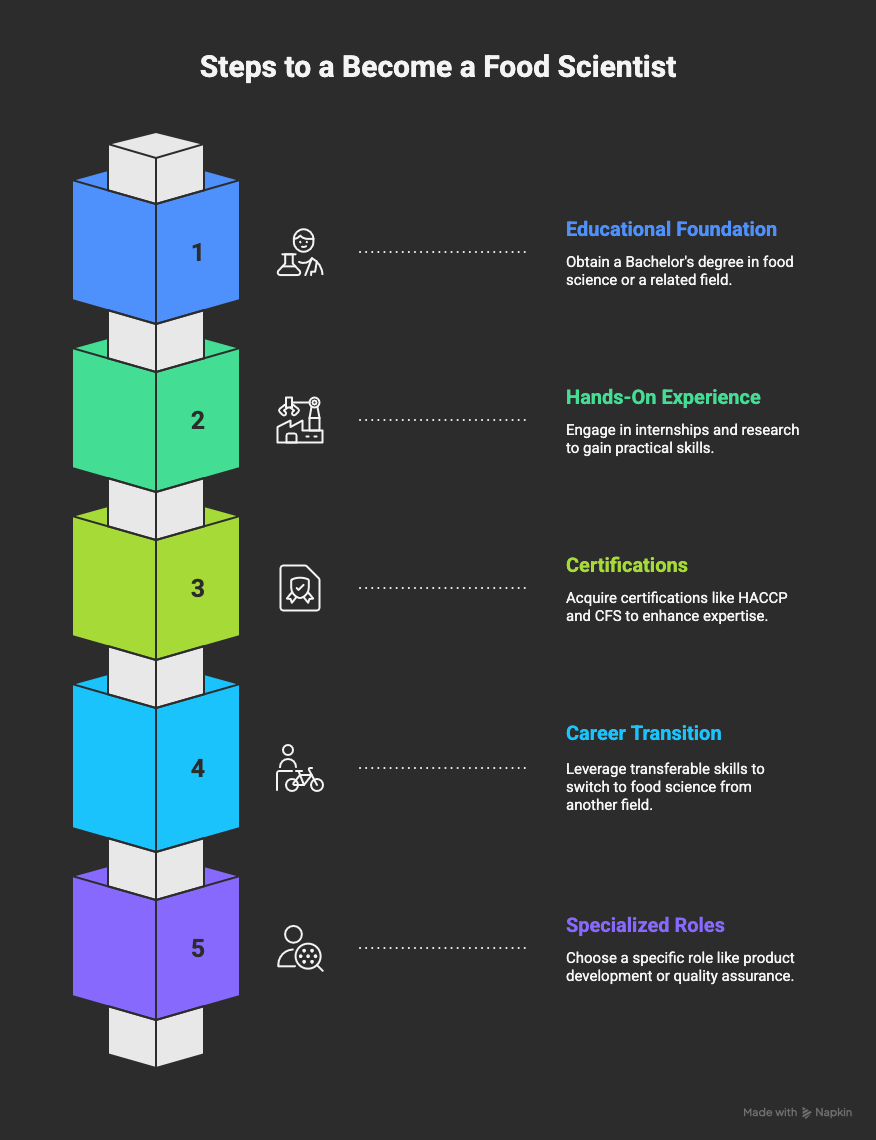How can you build a thriving career as a food scientist in 2025 and beyond?
Combine scientific knowledge with hands-on experience. Earn a degree in food science or a related field, pursue internships, add industry certifications like HACCP or CFS, and explore specialized roles from product development to food safety to build a future-proof career.
The food on your plate today is more science than you think.
Behind every bite, from plant-based burgers to shelf-stable snacks, stands a food scientist.
And the world needs more of them.
According to the U.S. Bureau of Labor Statistics, employment of agricultural and food scientists is projected to grow 8% from 2023 to 2033, faster than the average for all jobs.
That means if you’re considering this path, the timing couldn’t be better.
But breaking into food science requires more than curiosity, it demands the right education, practical experience, and a strategy for standing out.
This guide will walk you through degrees, internships, certifications, and career paths to help you build a successful journey in food science.
1. What is the Essential Educational Path?
Your journey starts with a strong educational foundation, and a Bachelor of Science degree is the non-negotiable entry ticket.
According to Manav Rachna University, this specialized degree covers the core curriculum you'll need: food chemistry, microbiology, engineering, and sensory analysis.
However, you can absolutely break into the field with a degree in a related science like Chemistry, Microbiology, Biology, or even Chemical Engineering.
If you choose this path, be strategic: load up on food-related electives and consider a minor in food science to make your transcript relevant.
For those interested in leadership or cutting-edge research, a Master's degree or a Ph.D. is a powerful asset that can unlock senior roles and higher earning potential.
Also Read: How to make a culinary arts resume?
2. How Can I Gain Crucial Hands-On Experience?
A degree gets you the interview, but experience gets you the job. Theory is useless without application.
Start seeking out experience from day one of your degree. Actively pursue internships and co-op programs.
These are structured, paid opportunities that provide an immersive look into the industry.
Don't just settle for any internship; target companies that align with your career interests, whether it's a global CPG giant or a nimble food-tech startup.
Beyond formal programs, get involved in undergraduate research with a professor.
This not only hones your lab skills but also demonstrates your passion and initiative. This kind of practical experience is exactly what hiring managers want to see on your resume.

3. What Certifications Will Make My Resume Stand Out?
Certifications are a powerful way to signal your expertise and commitment to the field. They show you've gone beyond the basic requirements and have specialized knowledge.
Here are some of the most valuable certifications in the food industry:
- HACCP (Hazard Analysis and Critical Control Points): This is a globally recognized certification that demonstrates your understanding of food safety management. It is a must-have for anyone working in quality assurance or food safety.
- Certified Food Scientist (CFS): Offered by the Institute of Food Technologists (IFT), the CFS credential is a prestigious certification that validates your broad knowledge and expertise across the food science discipline.
- FSSC 22000/ISO 22000: These are international standards for food safety management systems. Certifications in these standards are highly valued by multinational companies.
- Good Manufacturing Practices (GMP): This certification demonstrates your knowledge of the regulations and best practices for producing safe and high-quality food products.
4. Can I Switch to Food Science From Another Career?
Absolutely. The food industry is hungry for professionals with diverse backgrounds. Your existing skills can be a major asset.
If you're a career changer, the key is to bridge the gap between your current expertise and the requirements of the food science field.
If your original degree is in a non-science field, you may need to take some prerequisite science courses at a community college or as part of a post-baccalaureate program.
Look for graduate certificate programs in food science, which are specifically designed for professionals looking to pivot.
Highlight your transferable skills. If you have experience in project management, for example, emphasize your ability to lead projects, manage budgets, and meet deadlines.
Your unique perspective can be a significant advantage.
5. What Does a Food Scientist Actually Do?
A "food scientist" is an umbrella term for a variety of specialized roles. Understanding these specializations can help you tailor your career path.
- Product Development Scientist: These are the innovators. They work on creating new food products or improving existing ones. It's a creative role that involves experimenting with ingredients, formulations, and processing techniques.
- Quality Assurance (QA) Manager: QA managers are the guardians of quality and safety. They develop and implement systems to ensure that every product leaving the factory meets strict standards.
- Food Safety Specialist: These scientists focus on preventing foodborne illnesses. They are experts in microbiology and work to identify and eliminate potential hazards in the food supply chain.
- Sensory Scientist: This fascinating role involves studying how consumers perceive food. They design and conduct taste tests to gather data that guides product development and marketing.

Final Thoughts
Breaking into food science isn’t just about meeting the minimum requirements, it’s about positioning yourself to stand out in a competitive field.
From building the right academic foundation to stacking real-world experience and certifications, each step you take moves you closer to shaping the future of what we eat.
And if you’re looking for support along the way, Hiration can help streamline your journey - whether it’s refining your resume and cover letter, preparing for interviews, or strengthening your LinkedIn presence.
With the right preparation and guidance, you’ll be ready to step confidently into a career that’s both impactful and rewarding.
Food Science Career — FAQ
Is food science a good career choice in 2025?
Yes. Employment for agricultural and food scientists is projected to grow 8% from 2023–2033—faster than the national average—driven by innovation in food safety, sustainability, and product development.
What degree do I need to become a food scientist?
A Bachelor’s degree in Food Science is ideal, covering chemistry, microbiology, and sensory analysis. Degrees in related sciences like Biology or Chemical Engineering can also work with relevant electives or a food science minor.
How can students gain practical experience?
Pursue internships, co-op programs, and undergraduate research early in your studies. These hands-on experiences help you develop lab skills, understand real-world operations, and stand out to employers.
Which certifications boost a food science career?
Top credentials include HACCP, Certified Food Scientist (CFS), FSSC 22000/ISO 22000, and Good Manufacturing Practices (GMP). These certifications show expertise in safety and quality management—highly valued across industries.
Can professionals from other careers transition into food science?
Yes. Career changers can bridge the gap by taking prerequisite science courses or pursuing a post-baccalaureate certificate in food science. Transferable skills like project management and communication are strong assets.
What do food scientists actually do?
They research, test, and develop food products, ensuring quality, safety, and flavor. Common roles include product development scientist, food safety specialist, QA manager, and sensory scientist.
How can I stand out as a food scientist?
Blend academic credentials with certifications, real-world experience, and a professional resume that emphasizes innovation, lab skills, and collaboration in food product development.



